EDU30009: Primary Mathematics Assessment - Benefits and Limitations
VerifiedAdded on 2023/06/10
|8
|1997
|96
Report
AI Summary
This report examines mathematics assessment in primary schools, focusing on the benefits and limitations of various assessment methods such as formative, summative, and self/peer assessments. It emphasizes the importance of aligning assessment types with curriculum needs and considering the psychological impact on children. The report also discusses how different assessment types can encourage or discourage mathematical learning and development, highlighting the need for teachers to choose assessment techniques wisely to promote goal improvement, learning, and equity. This document is available on Desklib, a platform offering a wide range of study resources for students.
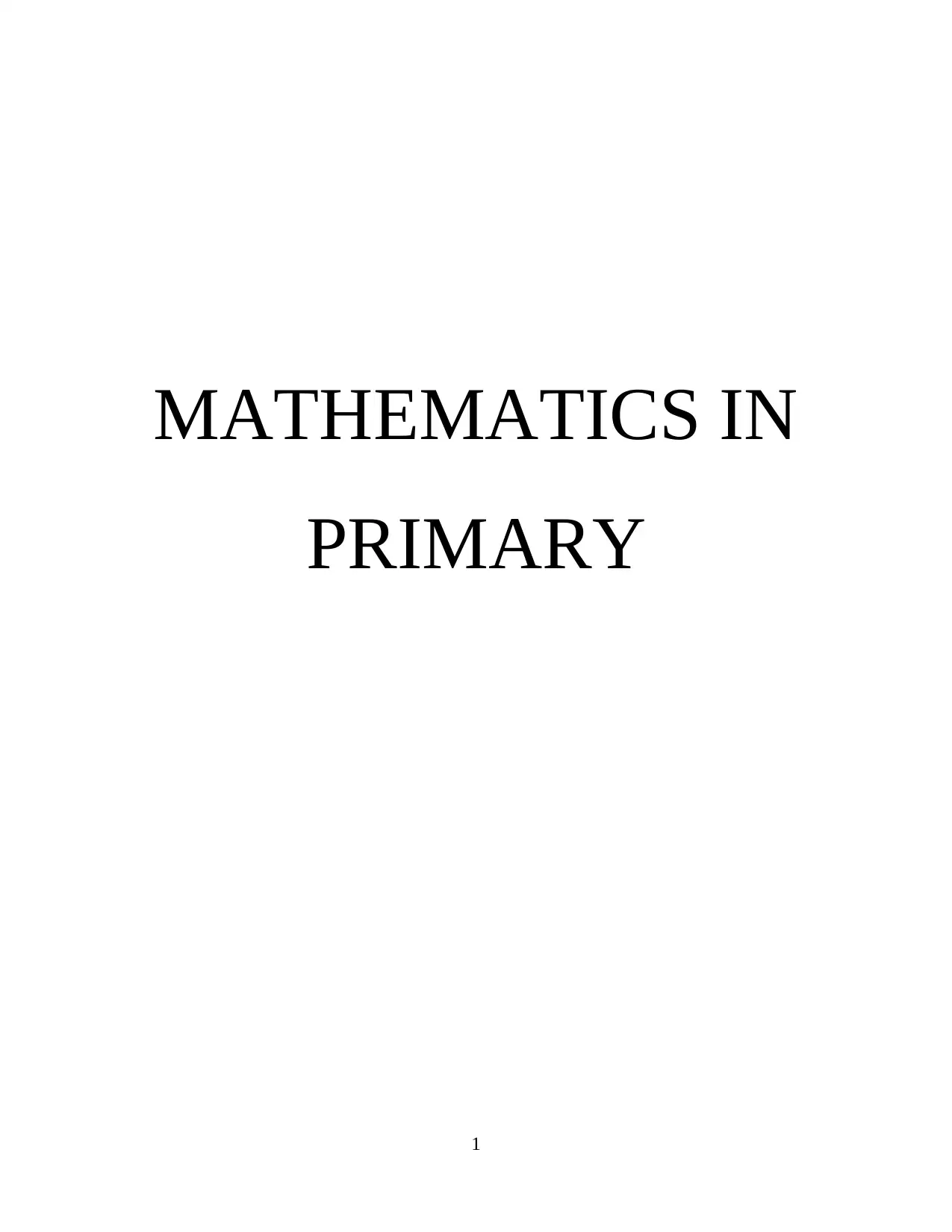
MATHEMATICS IN
PRIMARY
1
PRIMARY
1
Paraphrase This Document
Need a fresh take? Get an instant paraphrase of this document with our AI Paraphraser
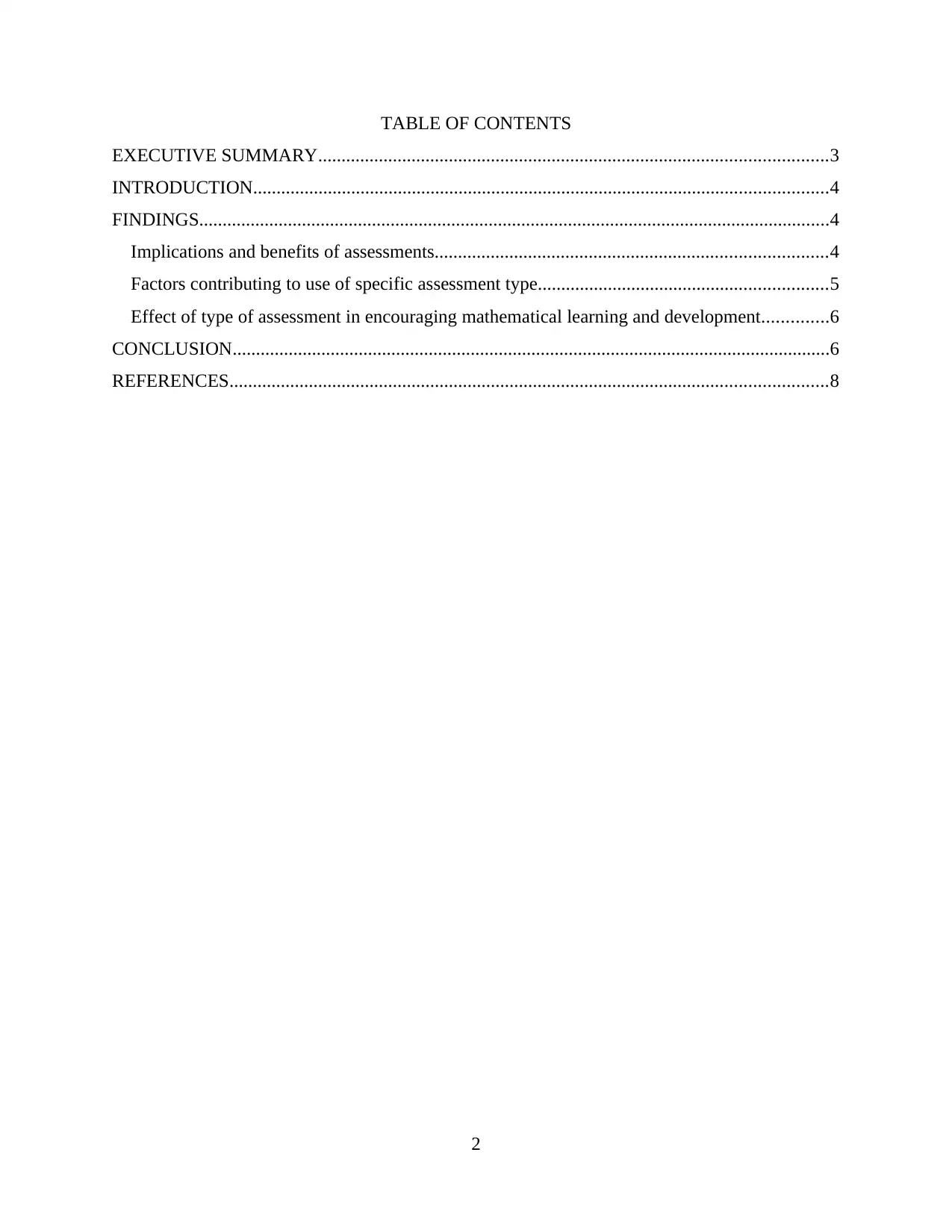
TABLE OF CONTENTS
EXECUTIVE SUMMARY.............................................................................................................3
INTRODUCTION...........................................................................................................................4
FINDINGS.......................................................................................................................................4
Implications and benefits of assessments....................................................................................4
Factors contributing to use of specific assessment type..............................................................5
Effect of type of assessment in encouraging mathematical learning and development..............6
CONCLUSION................................................................................................................................6
REFERENCES................................................................................................................................8
2
EXECUTIVE SUMMARY.............................................................................................................3
INTRODUCTION...........................................................................................................................4
FINDINGS.......................................................................................................................................4
Implications and benefits of assessments....................................................................................4
Factors contributing to use of specific assessment type..............................................................5
Effect of type of assessment in encouraging mathematical learning and development..............6
CONCLUSION................................................................................................................................6
REFERENCES................................................................................................................................8
2
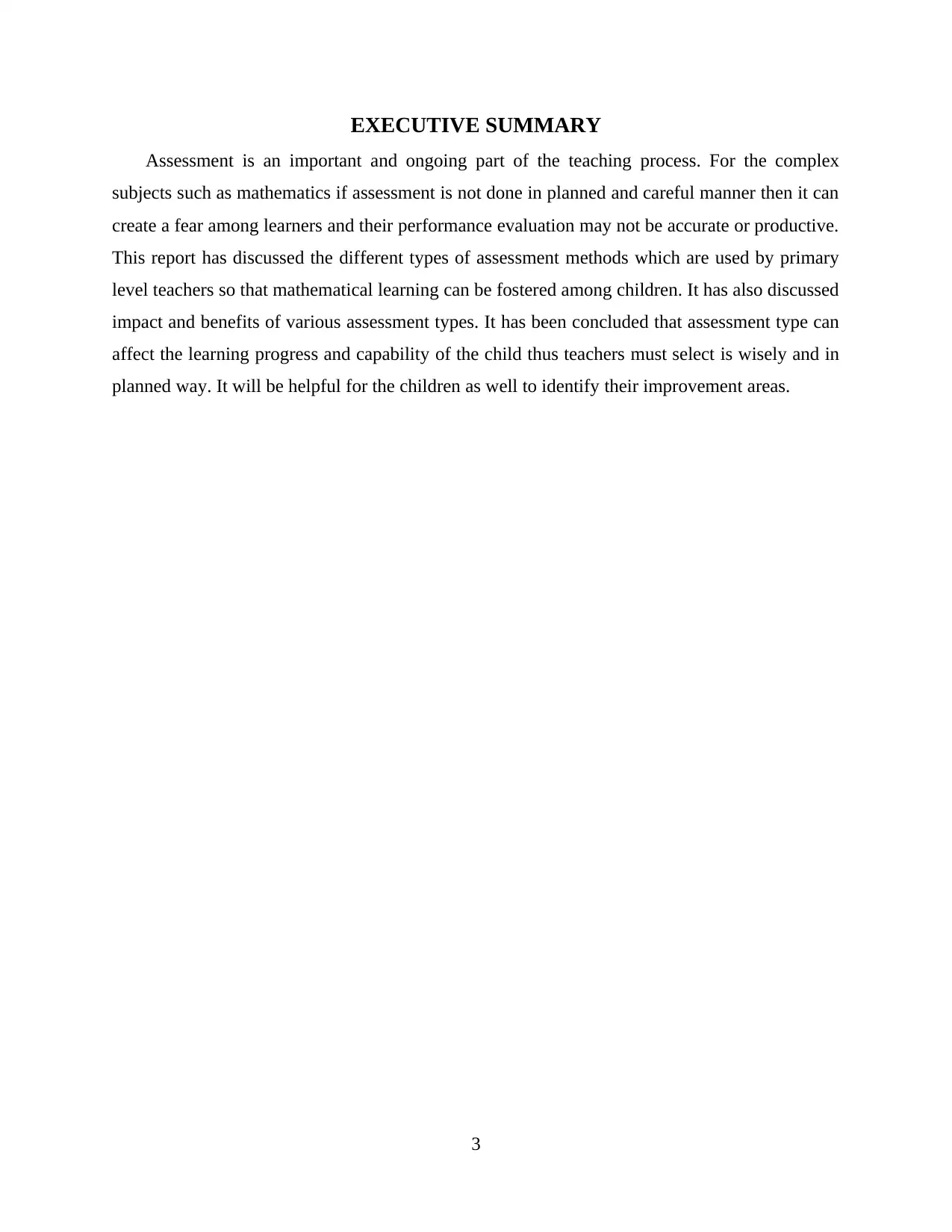
EXECUTIVE SUMMARY
Assessment is an important and ongoing part of the teaching process. For the complex
subjects such as mathematics if assessment is not done in planned and careful manner then it can
create a fear among learners and their performance evaluation may not be accurate or productive.
This report has discussed the different types of assessment methods which are used by primary
level teachers so that mathematical learning can be fostered among children. It has also discussed
impact and benefits of various assessment types. It has been concluded that assessment type can
affect the learning progress and capability of the child thus teachers must select is wisely and in
planned way. It will be helpful for the children as well to identify their improvement areas.
3
Assessment is an important and ongoing part of the teaching process. For the complex
subjects such as mathematics if assessment is not done in planned and careful manner then it can
create a fear among learners and their performance evaluation may not be accurate or productive.
This report has discussed the different types of assessment methods which are used by primary
level teachers so that mathematical learning can be fostered among children. It has also discussed
impact and benefits of various assessment types. It has been concluded that assessment type can
affect the learning progress and capability of the child thus teachers must select is wisely and in
planned way. It will be helpful for the children as well to identify their improvement areas.
3
⊘ This is a preview!⊘
Do you want full access?
Subscribe today to unlock all pages.

Trusted by 1+ million students worldwide
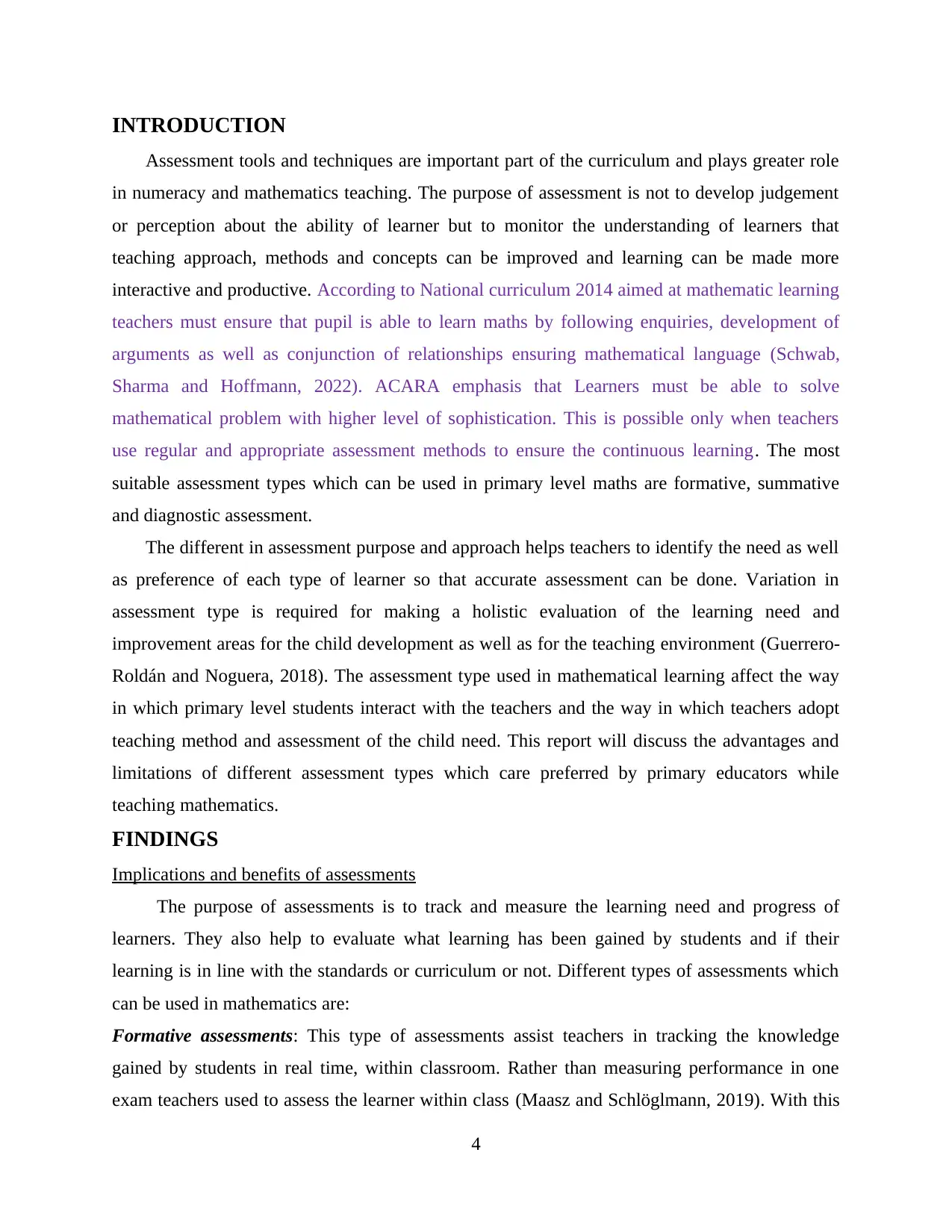
INTRODUCTION
Assessment tools and techniques are important part of the curriculum and plays greater role
in numeracy and mathematics teaching. The purpose of assessment is not to develop judgement
or perception about the ability of learner but to monitor the understanding of learners that
teaching approach, methods and concepts can be improved and learning can be made more
interactive and productive. According to National curriculum 2014 aimed at mathematic learning
teachers must ensure that pupil is able to learn maths by following enquiries, development of
arguments as well as conjunction of relationships ensuring mathematical language (Schwab,
Sharma and Hoffmann, 2022). ACARA emphasis that Learners must be able to solve
mathematical problem with higher level of sophistication. This is possible only when teachers
use regular and appropriate assessment methods to ensure the continuous learning. The most
suitable assessment types which can be used in primary level maths are formative, summative
and diagnostic assessment.
The different in assessment purpose and approach helps teachers to identify the need as well
as preference of each type of learner so that accurate assessment can be done. Variation in
assessment type is required for making a holistic evaluation of the learning need and
improvement areas for the child development as well as for the teaching environment (Guerrero-
Roldán and Noguera, 2018). The assessment type used in mathematical learning affect the way
in which primary level students interact with the teachers and the way in which teachers adopt
teaching method and assessment of the child need. This report will discuss the advantages and
limitations of different assessment types which care preferred by primary educators while
teaching mathematics.
FINDINGS
Implications and benefits of assessments
The purpose of assessments is to track and measure the learning need and progress of
learners. They also help to evaluate what learning has been gained by students and if their
learning is in line with the standards or curriculum or not. Different types of assessments which
can be used in mathematics are:
Formative assessments: This type of assessments assist teachers in tracking the knowledge
gained by students in real time, within classroom. Rather than measuring performance in one
exam teachers used to assess the learner within class (Maasz and Schlöglmann, 2019). With this
4
Assessment tools and techniques are important part of the curriculum and plays greater role
in numeracy and mathematics teaching. The purpose of assessment is not to develop judgement
or perception about the ability of learner but to monitor the understanding of learners that
teaching approach, methods and concepts can be improved and learning can be made more
interactive and productive. According to National curriculum 2014 aimed at mathematic learning
teachers must ensure that pupil is able to learn maths by following enquiries, development of
arguments as well as conjunction of relationships ensuring mathematical language (Schwab,
Sharma and Hoffmann, 2022). ACARA emphasis that Learners must be able to solve
mathematical problem with higher level of sophistication. This is possible only when teachers
use regular and appropriate assessment methods to ensure the continuous learning. The most
suitable assessment types which can be used in primary level maths are formative, summative
and diagnostic assessment.
The different in assessment purpose and approach helps teachers to identify the need as well
as preference of each type of learner so that accurate assessment can be done. Variation in
assessment type is required for making a holistic evaluation of the learning need and
improvement areas for the child development as well as for the teaching environment (Guerrero-
Roldán and Noguera, 2018). The assessment type used in mathematical learning affect the way
in which primary level students interact with the teachers and the way in which teachers adopt
teaching method and assessment of the child need. This report will discuss the advantages and
limitations of different assessment types which care preferred by primary educators while
teaching mathematics.
FINDINGS
Implications and benefits of assessments
The purpose of assessments is to track and measure the learning need and progress of
learners. They also help to evaluate what learning has been gained by students and if their
learning is in line with the standards or curriculum or not. Different types of assessments which
can be used in mathematics are:
Formative assessments: This type of assessments assist teachers in tracking the knowledge
gained by students in real time, within classroom. Rather than measuring performance in one
exam teachers used to assess the learner within class (Maasz and Schlöglmann, 2019). With this
4
Paraphrase This Document
Need a fresh take? Get an instant paraphrase of this document with our AI Paraphraser
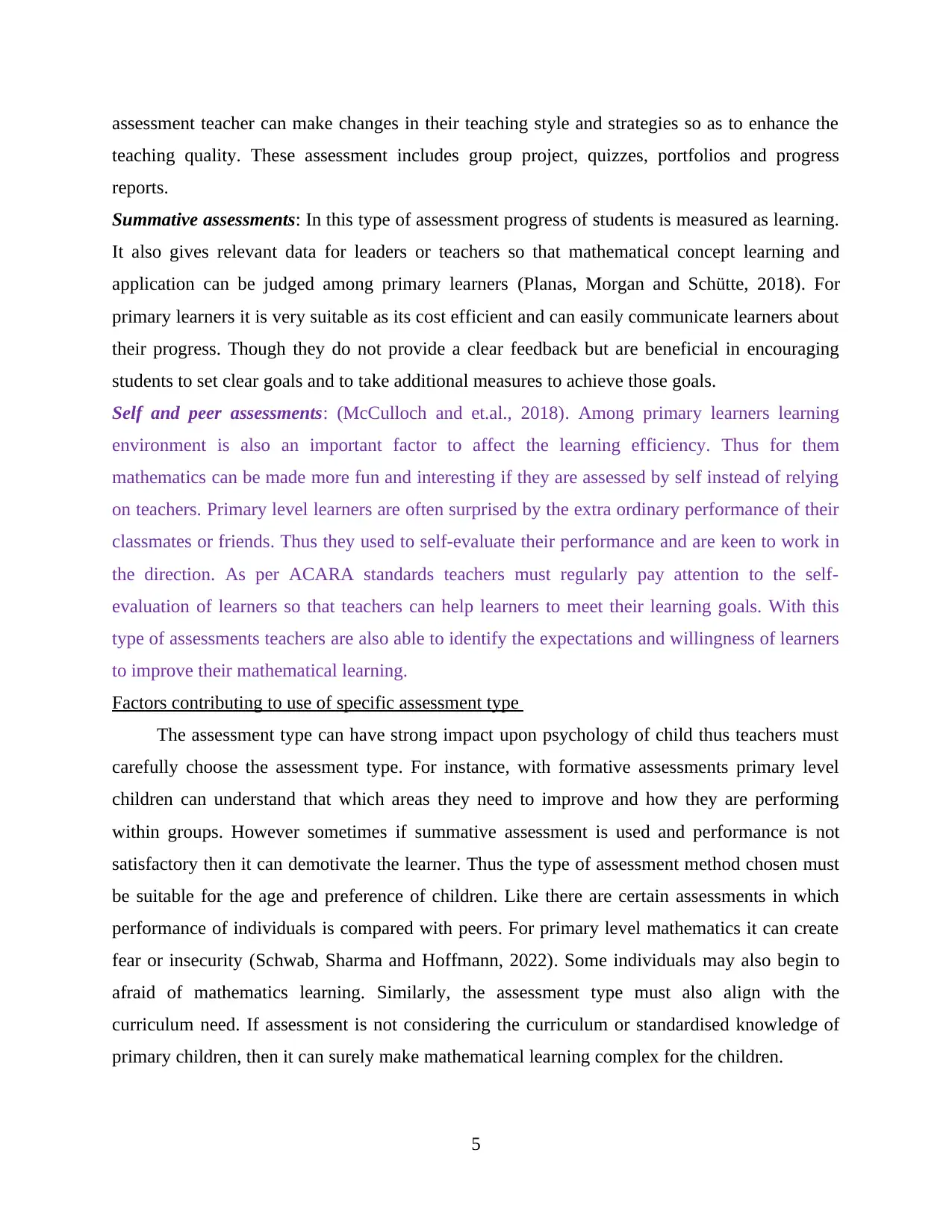
assessment teacher can make changes in their teaching style and strategies so as to enhance the
teaching quality. These assessment includes group project, quizzes, portfolios and progress
reports.
Summative assessments: In this type of assessment progress of students is measured as learning.
It also gives relevant data for leaders or teachers so that mathematical concept learning and
application can be judged among primary learners (Planas, Morgan and Schütte, 2018). For
primary learners it is very suitable as its cost efficient and can easily communicate learners about
their progress. Though they do not provide a clear feedback but are beneficial in encouraging
students to set clear goals and to take additional measures to achieve those goals.
Self and peer assessments: (McCulloch and et.al., 2018). Among primary learners learning
environment is also an important factor to affect the learning efficiency. Thus for them
mathematics can be made more fun and interesting if they are assessed by self instead of relying
on teachers. Primary level learners are often surprised by the extra ordinary performance of their
classmates or friends. Thus they used to self-evaluate their performance and are keen to work in
the direction. As per ACARA standards teachers must regularly pay attention to the self-
evaluation of learners so that teachers can help learners to meet their learning goals. With this
type of assessments teachers are also able to identify the expectations and willingness of learners
to improve their mathematical learning.
Factors contributing to use of specific assessment type
The assessment type can have strong impact upon psychology of child thus teachers must
carefully choose the assessment type. For instance, with formative assessments primary level
children can understand that which areas they need to improve and how they are performing
within groups. However sometimes if summative assessment is used and performance is not
satisfactory then it can demotivate the learner. Thus the type of assessment method chosen must
be suitable for the age and preference of children. Like there are certain assessments in which
performance of individuals is compared with peers. For primary level mathematics it can create
fear or insecurity (Schwab, Sharma and Hoffmann, 2022). Some individuals may also begin to
afraid of mathematics learning. Similarly, the assessment type must also align with the
curriculum need. If assessment is not considering the curriculum or standardised knowledge of
primary children, then it can surely make mathematical learning complex for the children.
5
teaching quality. These assessment includes group project, quizzes, portfolios and progress
reports.
Summative assessments: In this type of assessment progress of students is measured as learning.
It also gives relevant data for leaders or teachers so that mathematical concept learning and
application can be judged among primary learners (Planas, Morgan and Schütte, 2018). For
primary learners it is very suitable as its cost efficient and can easily communicate learners about
their progress. Though they do not provide a clear feedback but are beneficial in encouraging
students to set clear goals and to take additional measures to achieve those goals.
Self and peer assessments: (McCulloch and et.al., 2018). Among primary learners learning
environment is also an important factor to affect the learning efficiency. Thus for them
mathematics can be made more fun and interesting if they are assessed by self instead of relying
on teachers. Primary level learners are often surprised by the extra ordinary performance of their
classmates or friends. Thus they used to self-evaluate their performance and are keen to work in
the direction. As per ACARA standards teachers must regularly pay attention to the self-
evaluation of learners so that teachers can help learners to meet their learning goals. With this
type of assessments teachers are also able to identify the expectations and willingness of learners
to improve their mathematical learning.
Factors contributing to use of specific assessment type
The assessment type can have strong impact upon psychology of child thus teachers must
carefully choose the assessment type. For instance, with formative assessments primary level
children can understand that which areas they need to improve and how they are performing
within groups. However sometimes if summative assessment is used and performance is not
satisfactory then it can demotivate the learner. Thus the type of assessment method chosen must
be suitable for the age and preference of children. Like there are certain assessments in which
performance of individuals is compared with peers. For primary level mathematics it can create
fear or insecurity (Schwab, Sharma and Hoffmann, 2022). Some individuals may also begin to
afraid of mathematics learning. Similarly, the assessment type must also align with the
curriculum need. If assessment is not considering the curriculum or standardised knowledge of
primary children, then it can surely make mathematical learning complex for the children.
5
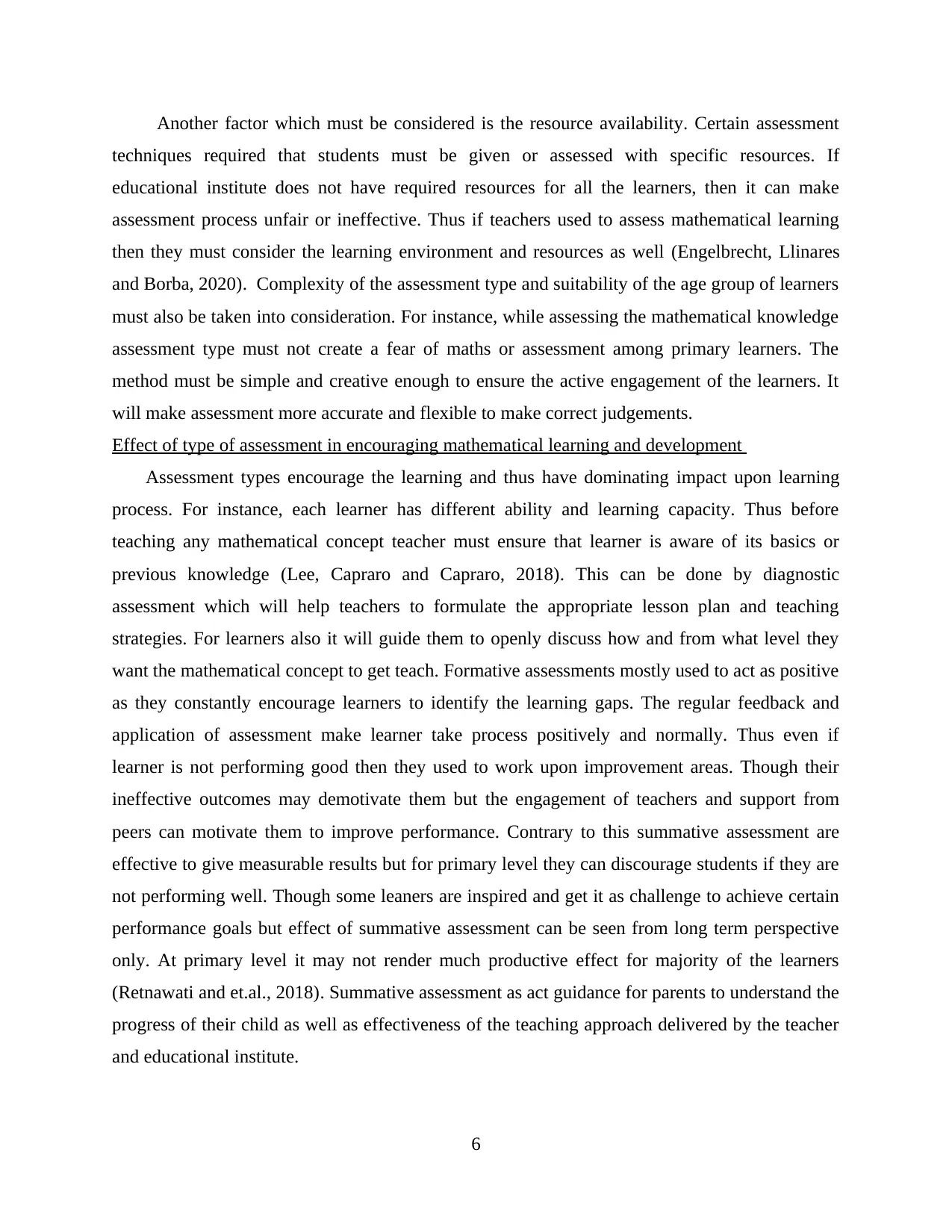
Another factor which must be considered is the resource availability. Certain assessment
techniques required that students must be given or assessed with specific resources. If
educational institute does not have required resources for all the learners, then it can make
assessment process unfair or ineffective. Thus if teachers used to assess mathematical learning
then they must consider the learning environment and resources as well (Engelbrecht, Llinares
and Borba, 2020). Complexity of the assessment type and suitability of the age group of learners
must also be taken into consideration. For instance, while assessing the mathematical knowledge
assessment type must not create a fear of maths or assessment among primary learners. The
method must be simple and creative enough to ensure the active engagement of the learners. It
will make assessment more accurate and flexible to make correct judgements.
Effect of type of assessment in encouraging mathematical learning and development
Assessment types encourage the learning and thus have dominating impact upon learning
process. For instance, each learner has different ability and learning capacity. Thus before
teaching any mathematical concept teacher must ensure that learner is aware of its basics or
previous knowledge (Lee, Capraro and Capraro, 2018). This can be done by diagnostic
assessment which will help teachers to formulate the appropriate lesson plan and teaching
strategies. For learners also it will guide them to openly discuss how and from what level they
want the mathematical concept to get teach. Formative assessments mostly used to act as positive
as they constantly encourage learners to identify the learning gaps. The regular feedback and
application of assessment make learner take process positively and normally. Thus even if
learner is not performing good then they used to work upon improvement areas. Though their
ineffective outcomes may demotivate them but the engagement of teachers and support from
peers can motivate them to improve performance. Contrary to this summative assessment are
effective to give measurable results but for primary level they can discourage students if they are
not performing well. Though some leaners are inspired and get it as challenge to achieve certain
performance goals but effect of summative assessment can be seen from long term perspective
only. At primary level it may not render much productive effect for majority of the learners
(Retnawati and et.al., 2018). Summative assessment as act guidance for parents to understand the
progress of their child as well as effectiveness of the teaching approach delivered by the teacher
and educational institute.
6
techniques required that students must be given or assessed with specific resources. If
educational institute does not have required resources for all the learners, then it can make
assessment process unfair or ineffective. Thus if teachers used to assess mathematical learning
then they must consider the learning environment and resources as well (Engelbrecht, Llinares
and Borba, 2020). Complexity of the assessment type and suitability of the age group of learners
must also be taken into consideration. For instance, while assessing the mathematical knowledge
assessment type must not create a fear of maths or assessment among primary learners. The
method must be simple and creative enough to ensure the active engagement of the learners. It
will make assessment more accurate and flexible to make correct judgements.
Effect of type of assessment in encouraging mathematical learning and development
Assessment types encourage the learning and thus have dominating impact upon learning
process. For instance, each learner has different ability and learning capacity. Thus before
teaching any mathematical concept teacher must ensure that learner is aware of its basics or
previous knowledge (Lee, Capraro and Capraro, 2018). This can be done by diagnostic
assessment which will help teachers to formulate the appropriate lesson plan and teaching
strategies. For learners also it will guide them to openly discuss how and from what level they
want the mathematical concept to get teach. Formative assessments mostly used to act as positive
as they constantly encourage learners to identify the learning gaps. The regular feedback and
application of assessment make learner take process positively and normally. Thus even if
learner is not performing good then they used to work upon improvement areas. Though their
ineffective outcomes may demotivate them but the engagement of teachers and support from
peers can motivate them to improve performance. Contrary to this summative assessment are
effective to give measurable results but for primary level they can discourage students if they are
not performing well. Though some leaners are inspired and get it as challenge to achieve certain
performance goals but effect of summative assessment can be seen from long term perspective
only. At primary level it may not render much productive effect for majority of the learners
(Retnawati and et.al., 2018). Summative assessment as act guidance for parents to understand the
progress of their child as well as effectiveness of the teaching approach delivered by the teacher
and educational institute.
6
⊘ This is a preview!⊘
Do you want full access?
Subscribe today to unlock all pages.

Trusted by 1+ million students worldwide
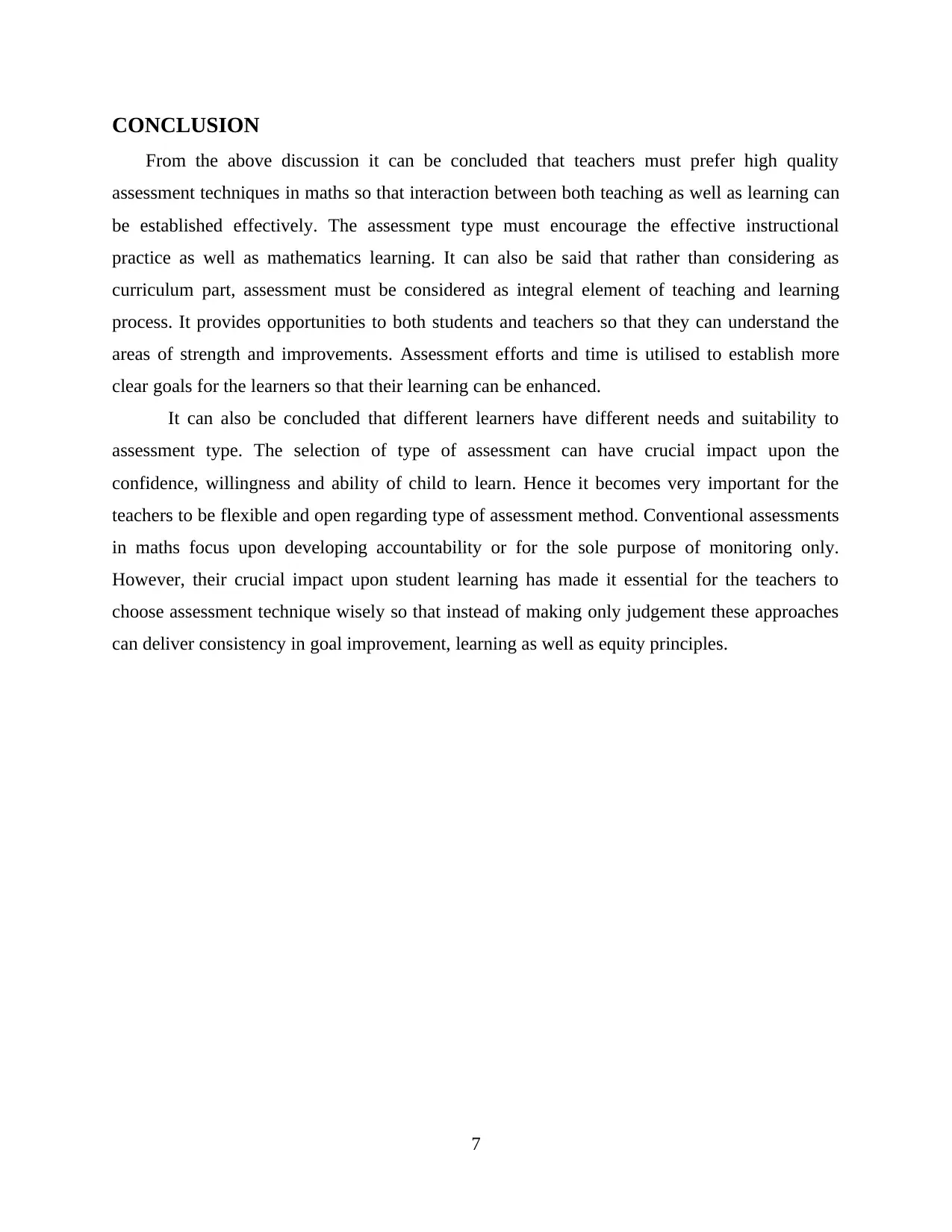
CONCLUSION
From the above discussion it can be concluded that teachers must prefer high quality
assessment techniques in maths so that interaction between both teaching as well as learning can
be established effectively. The assessment type must encourage the effective instructional
practice as well as mathematics learning. It can also be said that rather than considering as
curriculum part, assessment must be considered as integral element of teaching and learning
process. It provides opportunities to both students and teachers so that they can understand the
areas of strength and improvements. Assessment efforts and time is utilised to establish more
clear goals for the learners so that their learning can be enhanced.
It can also be concluded that different learners have different needs and suitability to
assessment type. The selection of type of assessment can have crucial impact upon the
confidence, willingness and ability of child to learn. Hence it becomes very important for the
teachers to be flexible and open regarding type of assessment method. Conventional assessments
in maths focus upon developing accountability or for the sole purpose of monitoring only.
However, their crucial impact upon student learning has made it essential for the teachers to
choose assessment technique wisely so that instead of making only judgement these approaches
can deliver consistency in goal improvement, learning as well as equity principles.
7
From the above discussion it can be concluded that teachers must prefer high quality
assessment techniques in maths so that interaction between both teaching as well as learning can
be established effectively. The assessment type must encourage the effective instructional
practice as well as mathematics learning. It can also be said that rather than considering as
curriculum part, assessment must be considered as integral element of teaching and learning
process. It provides opportunities to both students and teachers so that they can understand the
areas of strength and improvements. Assessment efforts and time is utilised to establish more
clear goals for the learners so that their learning can be enhanced.
It can also be concluded that different learners have different needs and suitability to
assessment type. The selection of type of assessment can have crucial impact upon the
confidence, willingness and ability of child to learn. Hence it becomes very important for the
teachers to be flexible and open regarding type of assessment method. Conventional assessments
in maths focus upon developing accountability or for the sole purpose of monitoring only.
However, their crucial impact upon student learning has made it essential for the teachers to
choose assessment technique wisely so that instead of making only judgement these approaches
can deliver consistency in goal improvement, learning as well as equity principles.
7
Paraphrase This Document
Need a fresh take? Get an instant paraphrase of this document with our AI Paraphraser
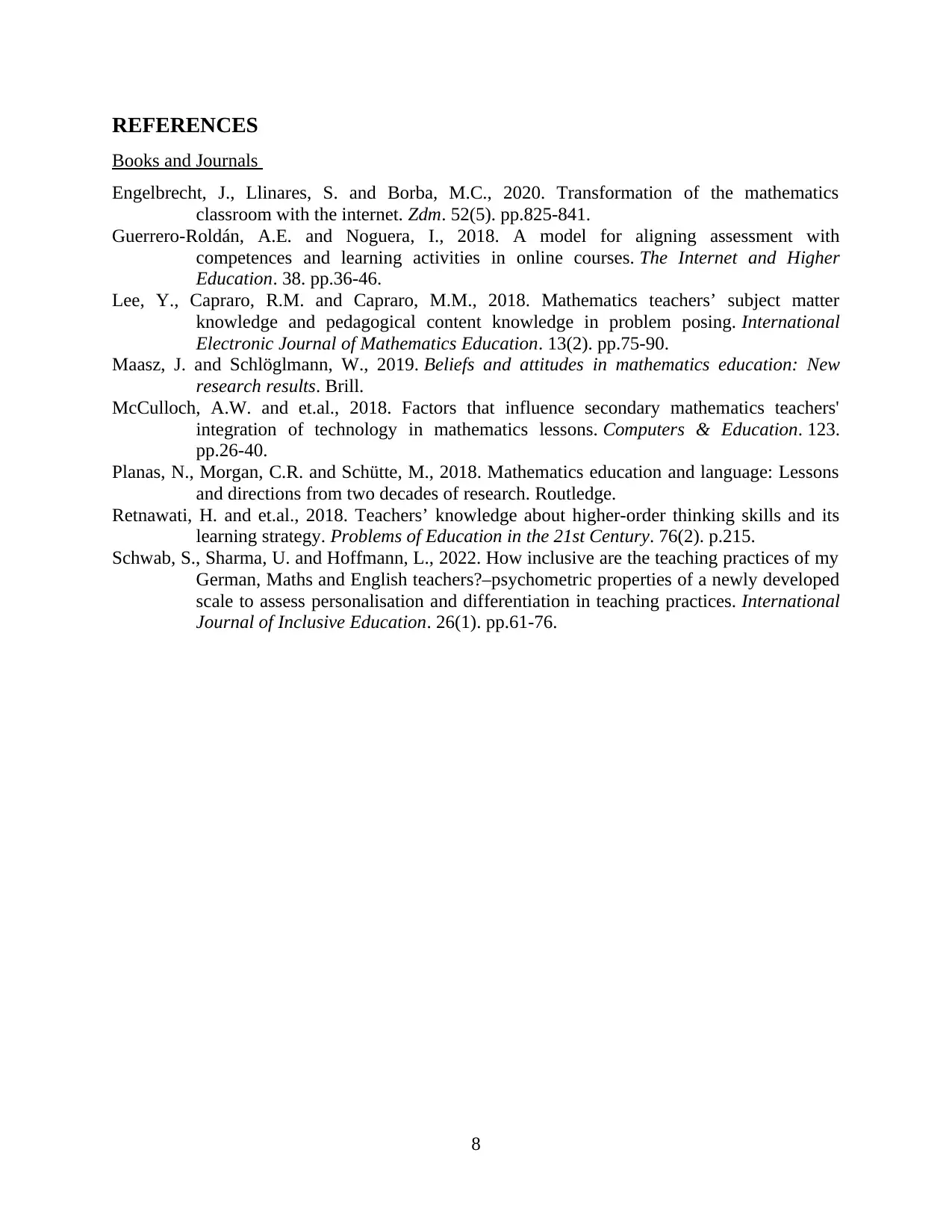
REFERENCES
Books and Journals
Engelbrecht, J., Llinares, S. and Borba, M.C., 2020. Transformation of the mathematics
classroom with the internet. Zdm. 52(5). pp.825-841.
Guerrero-Roldán, A.E. and Noguera, I., 2018. A model for aligning assessment with
competences and learning activities in online courses. The Internet and Higher
Education. 38. pp.36-46.
Lee, Y., Capraro, R.M. and Capraro, M.M., 2018. Mathematics teachers’ subject matter
knowledge and pedagogical content knowledge in problem posing. International
Electronic Journal of Mathematics Education. 13(2). pp.75-90.
Maasz, J. and Schlöglmann, W., 2019. Beliefs and attitudes in mathematics education: New
research results. Brill.
McCulloch, A.W. and et.al., 2018. Factors that influence secondary mathematics teachers'
integration of technology in mathematics lessons. Computers & Education. 123.
pp.26-40.
Planas, N., Morgan, C.R. and Schütte, M., 2018. Mathematics education and language: Lessons
and directions from two decades of research. Routledge.
Retnawati, H. and et.al., 2018. Teachers’ knowledge about higher-order thinking skills and its
learning strategy. Problems of Education in the 21st Century. 76(2). p.215.
Schwab, S., Sharma, U. and Hoffmann, L., 2022. How inclusive are the teaching practices of my
German, Maths and English teachers?–psychometric properties of a newly developed
scale to assess personalisation and differentiation in teaching practices. International
Journal of Inclusive Education. 26(1). pp.61-76.
8
Books and Journals
Engelbrecht, J., Llinares, S. and Borba, M.C., 2020. Transformation of the mathematics
classroom with the internet. Zdm. 52(5). pp.825-841.
Guerrero-Roldán, A.E. and Noguera, I., 2018. A model for aligning assessment with
competences and learning activities in online courses. The Internet and Higher
Education. 38. pp.36-46.
Lee, Y., Capraro, R.M. and Capraro, M.M., 2018. Mathematics teachers’ subject matter
knowledge and pedagogical content knowledge in problem posing. International
Electronic Journal of Mathematics Education. 13(2). pp.75-90.
Maasz, J. and Schlöglmann, W., 2019. Beliefs and attitudes in mathematics education: New
research results. Brill.
McCulloch, A.W. and et.al., 2018. Factors that influence secondary mathematics teachers'
integration of technology in mathematics lessons. Computers & Education. 123.
pp.26-40.
Planas, N., Morgan, C.R. and Schütte, M., 2018. Mathematics education and language: Lessons
and directions from two decades of research. Routledge.
Retnawati, H. and et.al., 2018. Teachers’ knowledge about higher-order thinking skills and its
learning strategy. Problems of Education in the 21st Century. 76(2). p.215.
Schwab, S., Sharma, U. and Hoffmann, L., 2022. How inclusive are the teaching practices of my
German, Maths and English teachers?–psychometric properties of a newly developed
scale to assess personalisation and differentiation in teaching practices. International
Journal of Inclusive Education. 26(1). pp.61-76.
8
1 out of 8
Related Documents
Your All-in-One AI-Powered Toolkit for Academic Success.
+13062052269
info@desklib.com
Available 24*7 on WhatsApp / Email
![[object Object]](/_next/static/media/star-bottom.7253800d.svg)
Unlock your academic potential
Copyright © 2020–2026 A2Z Services. All Rights Reserved. Developed and managed by ZUCOL.





